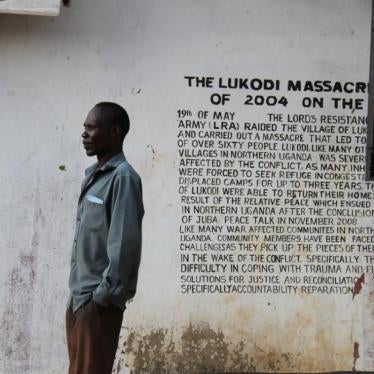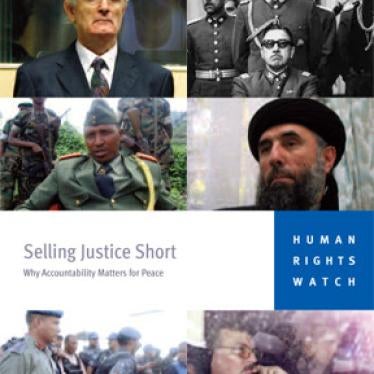(Rome) - As the Rome conference to create an International Criminal Court (ICC) enters its fifth and final week, new tabulations show a clear majority of countries favoring a strong and independent court. Human Rights Watch today called on these delegations to stand by their principles and not capitulate to threats of sabotage by the United States and the unprincipled objections of other countries who want to weaken the court's powers.
"The states who have championed an effective court now know they have a big majority," said Richard Dicker, who leads the ICC campaign for Human Rights Watch, an international monitoring organization based in New York.
The conference, potentially the most important rights parley since the 1949 Geneva Conventions were drafted, is creating a court to prosecute and punish individuals who in the future commit acts of genocide, crimes against humanity, and war crimes.
The results of last Thursday's debate provide an indirect poll of government positions, and show large majorities calling for the court to have an independent prosecutor, full jurisdiction over atrocities in civil wars, autonomy from the U.N. Security Council and the ability to investigate cases when any one of several interested states has ratified the court's statute.
These majorities include the 60-member "like-minded" group comprising Canada, Australia and virtually all European countries (except France), as well as key democracies such as South Korea, South Africa, Philippines, Senegal, Brazil, Argentina and Chile. The minority comprises powers such as the United States, Russia and China, as well as states traditionally hostile to international human rights mechanisms, such as Iraq, Nigeria and Indonesia.
In a statement last Thursday, the head of the United States delegation, Ambassador David Scheffer, stunned diplomats with the threat that the U.S. would "actively oppose this Court" unless the U.S. prevailed in limiting the court's authority. "In the face of blatant blackmail by the United States, which will not ratify the statute in any event, we look to the like-minded group to stand fast," said Dicker. "The success of this conference rests in the commitment of those states and others who will join them."
Even if other countries succumb to U.S. demands, Scheffer did not say the U.S. would join the court. He only held out the promise that he "could seriously consider favorably recommending to the United States Government that it sign the ICC treaty at an appropriate time in the future." "That's a long way away from actual ratification," noted Dicker. "No one is holding their breath."
In the debate, 62 countries took the floor to call for an independent prosecutor who can initiate cases, while only 25 countries sought to restrict cases to those referred by states and the Security Council. Sixty-six countries would allow the court to take up most cases when any one of several concerned states had ratified the court's statute, while some 18 delegations would bar the court from acting unless specified states had consented.
The following key issues remain to be decided:
1. An independent prosecutor: Some states (19), such as the U.S., China and Russia, maintain that the prosecutor should have to wait for states or the UN Security Council to bring cases to the ICC. States are notoriously reluctant, however, to register complaints against other states, so many crimes will go unpunished under this system. A majority (61) of countries have therefore have suggested that the prosecutor should be empowered to initiate an investigation based on information from any source, including individuals and non-governmental organizations.
2. The court's jurisdiction: According to various proposals (cumulatively backed by 18 states), the Court could take up crimes against humanity and serious war crimes only when certain states (the state with custody over the accused, the state of the accused's nationality or the state where the crime took place) have ratified the statute. Most states (66), however, have rallied to a South Korean proposal giving the court jurisdiction when any one of these states have ratified the treaty. Twenty (20) states argue that a ratifying state still must give its consent to particular cases or classes of cases, which would effectively paralyze the court. Sixty-four (64) states hold that once a state ratifies the treaty, it consents to all cases.
3. The role of the Security Council: Only China and Russia still insist on allowing the permanent members of the Security Council to veto the Court's jurisdiction -- and thereby manipulate the docket -- if the Council is already "dealing with" a situation that concerns international peace and security. The overwhelming majority -- including the United Kingdom and France -- support that "Singapore proposal": the Security Council, acting affirmatively, could tell the court to delay any prosecutions for a period of time if it believed this was necessary for the promotion of peace and international security. The United States announced Thursday that it was willing to consider this proposal despite its dissatisfaction with it.
4. Internal armed conflict: A few states, such as India and Mexico, argue that the Court's jurisdiction over crimes committed in internal conflicts should be very limited, ignoring the reality that most contemporary wars are fought within states, not between states. Nine (9) countries, including the United States and China, seek to limit the Court's jurisdiction over war crimes to those committed pursuant to a "plan or policy," thus excluding many serious massacres. A majority of states wants the Court to have full jurisdiction over war crimes in civil wars.
|
News Release
Rome Majority Favors Strong International Court
Human Rights Watch appeals to delegates to resist U.S. blackmail
Your tax deductible gift can help stop human rights violations and save lives around the world.
Region / Country
Most Viewed
-
January 7, 2026
UK: Protest Crackdowns Undermine Democracy

-
November 25, 2019
A Dirty Investment

-
May 12, 2025
The Gig Trap

-
February 27, 2026
Japan Should Adopt Regulation to Counter Uyghur Forced Labor

-
September 30, 2024
“They Destroyed What Was Inside Us”


